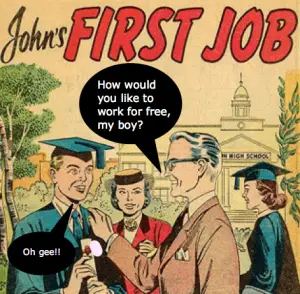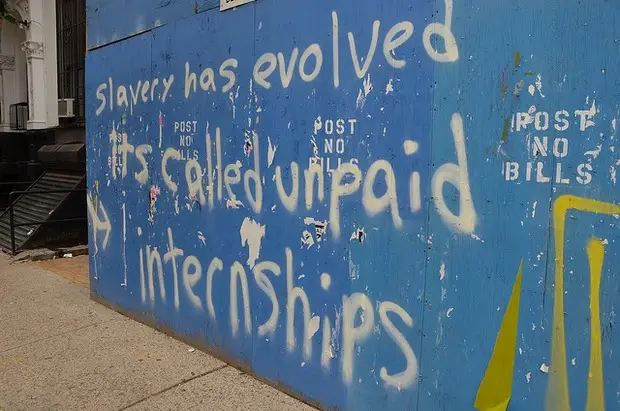The Harm in Unpaid Internships
Choosing between your future and your present is hardly a choice college students should have to make.
By Lauren Grimaldi, Roosevelt University
One of the larger purposes of obtaining a college education is to later get a job in a profession you enjoy and are dedicated to.
However, as is well known, employment across the various fields of study is incredibly scarce, and many college students struggle to find work after they receive their degree. Though it is wholly possible to set yourself apart from the pack of eager prospective employees through strong grades and hard work, it is also becoming more readily evident that employers desire related work experience more than having a perfect GPA.
 While such experience is truly important, it is imperative to realize that obtaining such practice in your collegiate years often comes via an internship—and that many, if not most, of the internships out there do not pay their workers. This problem is annoying to some students who quite reasonably would like to receive pay for their hard work, but, it is absolutely detrimental to the future of working class students who lose out on this coveted work experience, and are worse off in the job market as a result.
While such experience is truly important, it is imperative to realize that obtaining such practice in your collegiate years often comes via an internship—and that many, if not most, of the internships out there do not pay their workers. This problem is annoying to some students who quite reasonably would like to receive pay for their hard work, but, it is absolutely detrimental to the future of working class students who lose out on this coveted work experience, and are worse off in the job market as a result.
And unfortunately, it seems as though unpaid internships are becoming more common. Work experience is undoubtedly very valuable to help students become more comfortable professionally, but gaining experience does not pay for tuition or books. So, the concept of working for no pay in its entirety is troublesome to many. Students should not have to choose between making money and beginning to advance their career, though some are not even fortunate enough to have that choice in general. This is exactly how unpaid internships end up only further marginalizing students of the working class. Such disregard for these students hurts their careers and sets them back in the race for a job after graduation.
Students that need to work to offset the rising costs of college tuition cannot afford to spend 25-30 hours a week working for someone who does not pay them for their time. These students often work tedious jobs in retail or food service that are unhelpful to finding post-college employment. And because the scheduling at these types of jobs is often erratic, it is nearly impossible for the average working class college student to add on 20 hours a week at an internship in addition classes, work, and any on-campus organizations they may dedicate their time to.
By not being able to take up an unpaid internship, students’ resumes suffer tremendously. You do not have to have be an expert in hiring management to figure that out, and of course, recent graduates that have never had an internship surely find work in their field—but a lack of experience makes it all the more difficult to obtain employment after graduations.
But do not misunderstand—there are real benefits to having an internship.
Interning can connect you to important people that can, in theory, land you a real job after you graduate.
Real world, professional experience only makes you seem more viable to future employers, and though not having that experience does not make you completely invisible to employers, it certainly does not help.
This is why this is an especially tricky dilemma that weighs heavily on all working class students. Making money and paying for school are of utmost importance to so many students—and the desire to be able to pay for tuition should not come at the sacrifice of a hard-working students’ resume.
Since only certain students find working for free to be financially viable, it is not fair to the majority of those who work. Students whose nights and weekends are filled with work or catching up on their studies are inherently harmed by unpaid internships because they cannot participate in them if they wish to continue to be able to pay for school. Working class students do receive scholarships and aid to help them offset these overwhelming costs, but that assistance by no means covers everything needed to pay for school.
When students are stuck at a meaningless minimum wage job for 20-30 hours a week, they are hurting their chances at prospective employment in the future because they could be at an internship if it simply was a paying job. Anyone who has been intern knows that there is a lot asked of you, so the prospect of being financially compensated for your work is not outrageous by any means.
Of course, employers are in favor of not paying their interns because it is beneficial to them, but by not paying they are only giving greater privilege to the students of certain economic classes that can afford to work for free.
But don’t get it twisted, this argument is not an attempt to say that anyone who can work at an unpaid internship is a member of the elite who needs not be concerned at all with money, but there is a great privilege that comes with being able to work for free that often goes unrecognized.
Now, it is probably fairly unreasonable for everyone to begin paying their interns, and especially smaller companies and employers at that. But one thing that can be changed is how internships are viewed on a resume; if they cannot be readily available to every college student, then they should simply be viewed as another factor in a collegiate experience.
With employment amongst college students so scarce, it’s easy to see why the temptation to work for free is so strong.
Internships can lead to future steady employment, but not always. This is why employers paying students with workplace experience is a ridiculous benefit to advertise when hiring.
It will take a lot to actually get rid of unpaid internships entirely, but they must now be recognized at not just an annoyance to students, but a hindrance on the future of students who need to work as much as possible for pay.











